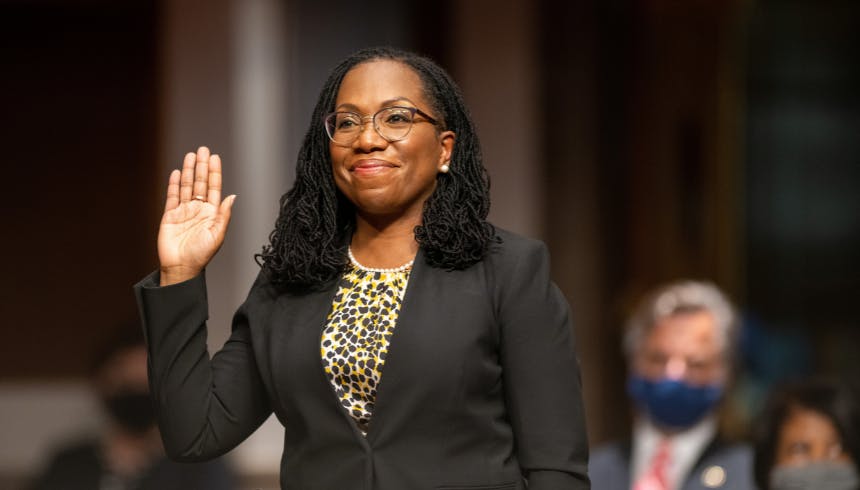History was made when Ketanji Brown Jackson was confirmed to the highest court in the United States, not only being the first African American woman but also shattering the glass ceiling of the white male majority on the court that has existed for 233 years.
Through the appointment process, Jackson had been a frontrunner for many, including Michigan State University law professor Frank Ravitch, keeping her one of his top potential candidates for the seat due to her bulletproof credentials, while also being young enough to remain on the court for years to come.
“Her credentials are incredible by any standards,” Ravitch said. “If you look at the justices, for example, that have been appointed since the 1960s, her credentials are among the best of any justice to have been nominated.”
Ravitch also knew that her background would be relatable enough to a general consensus that the public would stand behind her nomination.
“I do think it's very important that the U.S. Supreme Court reflects the American public,” Ravitch said. “I think that her background … as an African American woman who has had to fight against the grain her entire career is quite important. I also think that her … being the first public defender is important.”
The most crucial factor and strength that Jackson can bring to the bench is being a strong consensus builder across the Court, Ravitch said.
“Look at the fact that she was supported by the fraternal order of police as a public defender,” Ravitch said. “That shows an ability to see both sides, and that’s something that’s extremely important in a Supreme Court Justice. That’s something I haven’t seen enough reporting on”
Social relations and policy junior and Black Undergraduate Law Association President Safiya Webster said her initial reaction was that she had a sense of encouragement after President Joe Biden nominated her to the Supreme Court.
“Seeing a Black woman have the opportunity to be in such a position with such impact and power that affects American society, in the justice system,” Webster said. “It just gave me a sense of encouragement. That I can be, I will be able to be a judge, and I will be able to make an impact.”
Comparative cultures and politics junior and Black Undergraduate Law Association Vice President Bayan Farah said she felt like Jackson’s confirmation hearing is a good representation of how minorities, especially Black Americans, experience double standards in comparison with their white colleagues.
Farah said there were a lot of different moments where she felt Jackson was getting a ridiculous line of questioning from senators that were not relevant to her being on the Supreme Court. Farah said when she saw Sen. Ted Cruz, R-TX, was holding up a book titled “Antiracist Baby,” she thought it was unnecessary.
“That was one moment that I was like, ‘Are you freaking serious right now?’” Farah said. “It’s just something that happens to Black women on the daily. Throughout work or just daily lives. I feel like we are constantly being questioned but in a way that’s just so irrelevant.”
While Ravitch believes that her opinions are well done and fireproof when it comes to questioning, he believes that they were mischaracterized by those on the Hearing Committee, specifically Hawley, Cruz and Graham.
The biggest offender in Ravitch’s opinion was Sen. Josh Hawley, R-MO, who questioned Jackson on her child pornography case opinions, questioning and accusing her of giving the lowest sentencing.
“They were making it seem like she gave the lowest sentence under the sentencing guidelines, but the sentencing guidelines had changed, so she was following the sentencing guidelines as they were at that time given certain facts in those specific changes,” Ravitch said.
He believed that these questions misunderstood the role of a federal judge, which is usually odd for people sitting on a judiciary committee.
“They brought up things that just ranged from extremely odd to purely factually inaccurate, and there’s a lot of the factually inaccurate, to just downright stupid,” Ravitch said.
Ravitch continued to compare Jackson’s trial to Kavanaugh’s, highlighting the major and very serious question of sexual assault that existed at the time of his questioning. He questioned the Republicans that pushed him through but may have been hesitant to confirm Jackson to the Court.
“However one feels about Kavanaugh ultimately being confirmed, if you’re one of the senators who voted to confirm him in light of that question, then how do … you not confirm her, who does not have that question at all and who has almost identical credentials?”
One outcome from this confirmation that does not affect history is the lack of change in the balance of the court. Jackson will still be one of three Democrat-appointed justices compared to the six Republican-appointed justices who will be dominating the court rulings.
Support student media!
Please consider donating to The State News and help fund the future of journalism.
“I don’t want to have such high expectations for her because even though I know she is an incredible woman and believe in all of her views – I 100% can see how they could be shut down,” Farah said. “I do feel like I see a potential in her experience being able to analyze cases be reflected on Supreme Court decisions, but also at the same time, I do understand that change will not happen immediately.”
Social relations and policy sophomore and events coordinator for the Black Undergraduate Law Association Devin Roberts wanted to diversify and round out the court with this added judge, but does not see this in reality.
“Sadly, the seat doesn’t really change the balance of the court,” Roberts said. “They still have the court on lock because it's her and Breyer, so it's one democrat to another.”
Farah said that the most emotional part of Jackson’s hearing for her was when Jackson apologized to her daughters for struggling with the balance of career and parenthood, telling them that she loves them.
“That was very emotional for me just because it reminded me of my mom,” Farah said. “So, it was very emotional because a lot of Black moms in America just literally have the whole entire weight of the world on their shoulders. … That was the only time that I actually cried because I feel like she gives hope to other Black women and other Black mothers, especially those who just have a lot to make up for, who always struggled to balance being a parent and also working so much.”
Discussion
Share and discuss “Black MSU students inspired by Ketanji Brown Jackson's ascent to Supreme Court” on social media.







